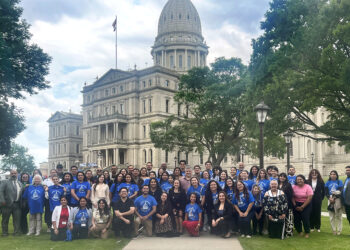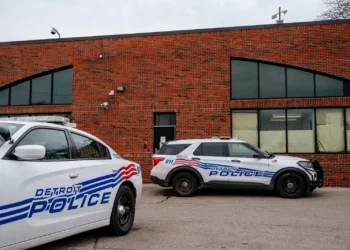On Monday, July 31, Governor Gretchen Whitmer signed a balanced, bipartisan general government state budget for Fiscal Year 2024 to grow the economy, lower costs, deliver on kitchen-table issues, and help anyone “Make it in Michigan.”
The FY24 budget, when combined with the education budget previously signed by the governor, lowers costs on health care, preschool, meals for kids, higher education, housing, and workforce training. Additionally, the fiscal year 2024 budget will help fix bridges, replace lead pipes, and protect public safety.
“The Make it in Michigan budget will lower costs, deliver on the issues that make a real difference in people’s lives, and help anyone ‘make it’ in Michigan,” said Governor Whitmer. “The budget protects public safety and improves access to health care, ensuring people feel safe in their neighborhood and have access to quality, affordable care that meets their needs. It supports our service members and veterans, connecting them and their families with the resources they deserve, and will build up all kinds of infrastructure so every family has safe roads, clean water, and affordable housing. Finally, it continues powering our economic development efforts to create tens of thousands of good-paying jobs, and bring manufacturing and supply chains home to Michigan. The Make it in Michigan budget builds on our economic momentum, and will help us build a brighter future for everyone who calls this great state home.”
“The budget signed into law by Governor Whitmer today funds programs and services that benefit residents across the state and saves money for a rainy day,” said State Budget Director Christopher Harkins.
“This budget builds on the Governor’s previous success of delivering targeted tax relief and delivers investments to improve the lives of the people of our great state.”
The FY24 budget totals $81.7 billion, including a general fund total of $15.2 billion.
Fiscally Responsible, Balanced Budget
The budget deposits $200 million into the Budget Stabilization Fund, or ‘rainy day fund,’ bringing the balance to nearly $2 billion by the end of FY24, an all-time high.
Public Health – Strengthening Families
The budget makes critical investments to ensure Michigan families can access the care they need:
- $150.6 million to increase reimbursement rates for Medicaid services to improve enrollee access to necessary health care.
- $49.5 million to implement recommendations from the Racial Disparities Task Force, including neighborhood health grants, mobile health units, sickle cell support and more.
- $56.4 million to fund Healthy Moms, Healthy Babies, a bipartisan initiative that supports pregnant women, new mothers, and infants.
- $25 million increase in support to local health departments to provide essential services.
- $10 million to create a new foster care respite care program to provide temporary, occasional relief to foster parents.
- $6.2 million to fund the Medicaid Plan First! program, expanding access to family planning services and cancer screening and saving 25,000 Michiganders an average of $2,000.
- $4.9 million over 2 years for Double-Up Food Bucks, boosting access to fresh fruits and vegetables for Michiganders on food assistance.
Public Safety – Keeping Communities Safe
To keep families and communities safe and ensure police officers and first responders have the funding and resources they need, the budget invests:
- $171.5 million in public safety grants, benefitting communities across the state.
- $34.2 million to enact various recommendations from the Task Force on Juvenile Justice Reform, including creating a Juvenile Justice Services Division within the State Court Administrative Office and expanding the scope of the Office of the Children’s Advocate.
- $18.2 million to provide in-service training to licensed law enforcement officers.
- $14.4 million to improve safety and accountability in correctional facilities, including $7 million to outfit corrections officers with body cameras.
- $10 million toward leveraging the State Police Training Academy to serve as a criminal justice training hub to support realistic, multi-disciplinary training opportunities for law enforcement agencies across the state.
- $10 million for the Selfridge Air National Guard Base to improve and maintain infrastructure to continue to position Michigan to compete for next generation aircraft and future fighter missions.
- $10.5 million in new statutory revenue sharing (2% one-time) dedicated specifically for public safety, including employee recruitment, retention, training, and equipment for first responders.
- $9 million to run a Michigan State Police Trooper Recruit School, graduating an anticipated 50 new recruits.
- $6.8 million to establish the Office of Community Violence Intervention Services to partner with community-based organizations already working to reduce violent incidents.
- $5 million to expand the Jobs Court, a program that aims to reduce recidivism by providing jobs and services to disadvantaged offenders.
- $5 million to expand National Guard tuition assistance program, expanding educational opportunities for service members and their families and moving Michigan closer to the Sixty by 30 Goal.
- $2.9 million to implement gun violence prevention policies.
- $2 million for veteran homelessness grants, helping veterans access affordable housing and avoid homelessness.
- $1.2 million for veteran suicide prevention efforts, improving the health and well-being of Michigan’s more than 550,000 military veterans and their families.
Rebuilding Infrastructure
From 2019 through the end of this construction season, nearly 20,000 lane miles of road and 1,400 bridges will be fixed. This budget continues to fix roads, replace lead pipes, build housing, and more:
Roads, Bridges, Transit, Electrification
- $416 million to fix roads and build up public infrastructure, improving quality of life.
- $80 million investment supporting Michigan’s Bridge Bundling program to replace or rehabilitate more than 20 structurally deficient bridges across the state.
- $50 million for Intermodal Capital Investment Grants to support investments in rail, marine, intercity, and local transit infrastructure that have the potential to leverage federal funding opportunities.
- $21.3 million for clean energy and electric vehicle infrastructure investments.
- $52.9 million for the Information Technology and Investment Fund for modernization of legacy IT systems supporting local income tax collections for those communities that elect to participate, environmental permitting and inspection, groundwater protection, occupational safety and health, and talent recruitment and retention.
- $1 million to begin the transition of the State of Michigan’s fleet to electric vehicles.
- $5 million for a critical mineral recycling research hub.
Housing
- $212 million for residential energy efficiency improvements through federal funds, lowering costs for Michiganders via point-of-sale rebates for home appliances, water heaters and more.
- $50 million for the Housing and Community Development Program to alleviate affordable housing needs across the state and revitalize downtown areas in Michigan.
- $10 million for Missing Middle housing programs to build on existing $50 million within the current year budget.
- $2 million to expand capacity of the State Land Bank Authority, which facilitates productive reuse of land in our communities.
Water, Parks, Agriculture, Environment
- Nearly $600 million for Michigan’s water infrastructure, protecting access to drinking water, replacing lead service lines, rebuilding sewers, and more.
- $150 million to reopen the Palisades nuclear power plant, securing good-paying jobs.
- $23 million for improvements at Belle Isle State Park.
- $23 million to create an endowment for the new Flint State Park.
- $20 million to establish an environmental justice contaminated site clean-up fund to remediate and redevelop contaminated sites in historically disadvantaged and underrepresented communities.
- $13 million for agricultural climate resiliency and soil health to research new regenerative agriculture practices and help farmers reduce run off and increase crop diversity.
- $10.1 million for Resilient Food Systems Infrastructure Program, using federal funds to boost resiliency in Michigan’s food systems.
- $7.7 million in state parks operations funding to provide additional park rangers and essential resources to state parks.
- $5.5 million for Michigan Saves to incentivize private investment in clean energy improvements for Michigan residents and businesses.
Economic Development
To create good-paying jobs and bring manufacturing and supply chains home, the budget powers economic development efforts, including:
- $500 million annual deposit in the Make it in Michigan Fund, also known as the bipartisan Strategic Outreach and Attraction Reserve (SOAR) Fund.
- $350 million for the Make it in Michigan Competitiveness Fund to win federal resources from the Bipartisan Infrastructure Law, the CHIPS and Science Act, and the Inflation Reduction Act.
- Michigan is set to receive over $1.5 billion (4th highest in the nation) through the Broadband Equity, Access, and Deployment (BEAD) program to expand high-speed internet access to over 200,000 Michiganders in unserved and underserved areas across the state.
- $50 million for Revitalization and Placemaking to fund community development projects.
- $15 million for talent action teams to fast-track assistance to businesses looking to expand or locate in Michigan.
- $10 million to promote Michigan as a destination for special events and national conventions, plus an additional $10 million in convention and visitor bureau grants.
- $5 million for the Michigan Defense Center to protect and grow the defense and homeland security industry in Michigan.
For more information on the FY24 budget, see House Bill 4437 for the general budget and Public Act 103 of 2023 for the education budget.

















































